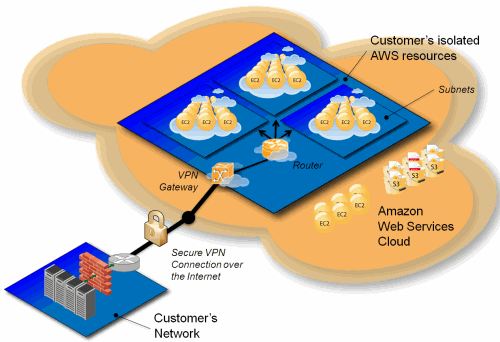Amazon Web Services will now offer the option for everyone to have their own virtual private cloud (VPC), another sign of the company’s intent to push into the enterprise market. The service means that every customer using EC2 will see the option for a VPC as an instance type. Until now, the VPC was a separate service.
A VPC lets customers create what AWS calls a “virtual network of logically isolated EC2 instances and an optional VPN connection to your own datacenter.” That development has implications for customers who are weighing the benefits of a data-center centric approach that virtualizes a network of physical centers to create their own elastic infrastructure. The problem comes down to the cost of licensing, new hardware and the IT staff to manage it all. It’s a model promoted by companies like VMware, which are looking to extend the reach of their virtualization technology.
AWS takes a different approach. It gives customers the capability to take advantage of the low-cost and flexibility of AWS while leveraging the infrastructure that they already own.
Instances will launch into what AWS calls the “EC2-VPC” platform. AWS will roll out the feature by region, starting with the Asia-Pacific (Sydney) and South America (São Paulo) regions. The rollouts will begin in the next several weeks.
The process is automated so customers won’t need to create a VPC beforehand. Instead, according to AWS, a customer would launch EC2 instances or provision Elastic Load Balancers, RDS databases, or ElastiCache clusters like they would in EC2-Classic and a VPC is created with no extra charge.
At that point, customers can take advantage of features, such as assigning multiple IP addresses to an instance, changing security group membership on the fly, and adding egress filters to security groups.
According to AWS, VPCs are compatible with existing shell scripts, CloudFormation templates, AWS Elastic Beanstalk applications, and Auto Scaling configurations.
The new VPC features are available to new AWS customers and existing customers launching instances in a region for the first time.
The enterprise market has shifted in the past 12 to 18 months as CIOs have come to accept cloud computing, said Scott Sandell, a general partner with NEA Ventures in a conversation here at SXSW. He said it means all enterprise technology in a data center is obsolete. AWS’ move points to the shift in the market and the higher value on services that leverage the cloud as opposed to significant investments in new and existing infrastructure.

